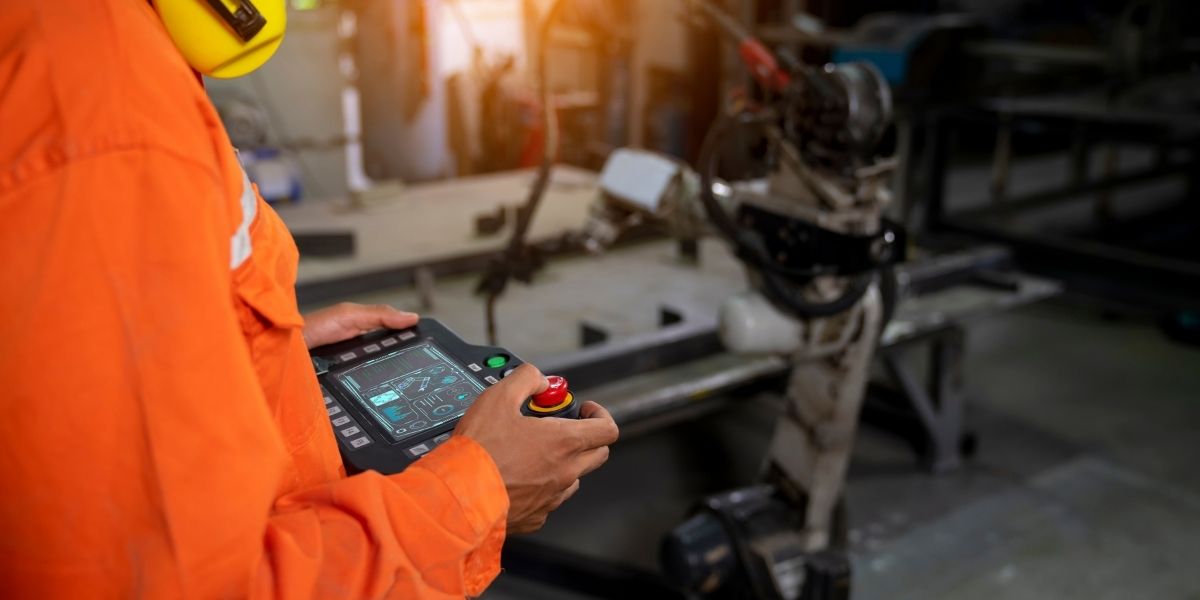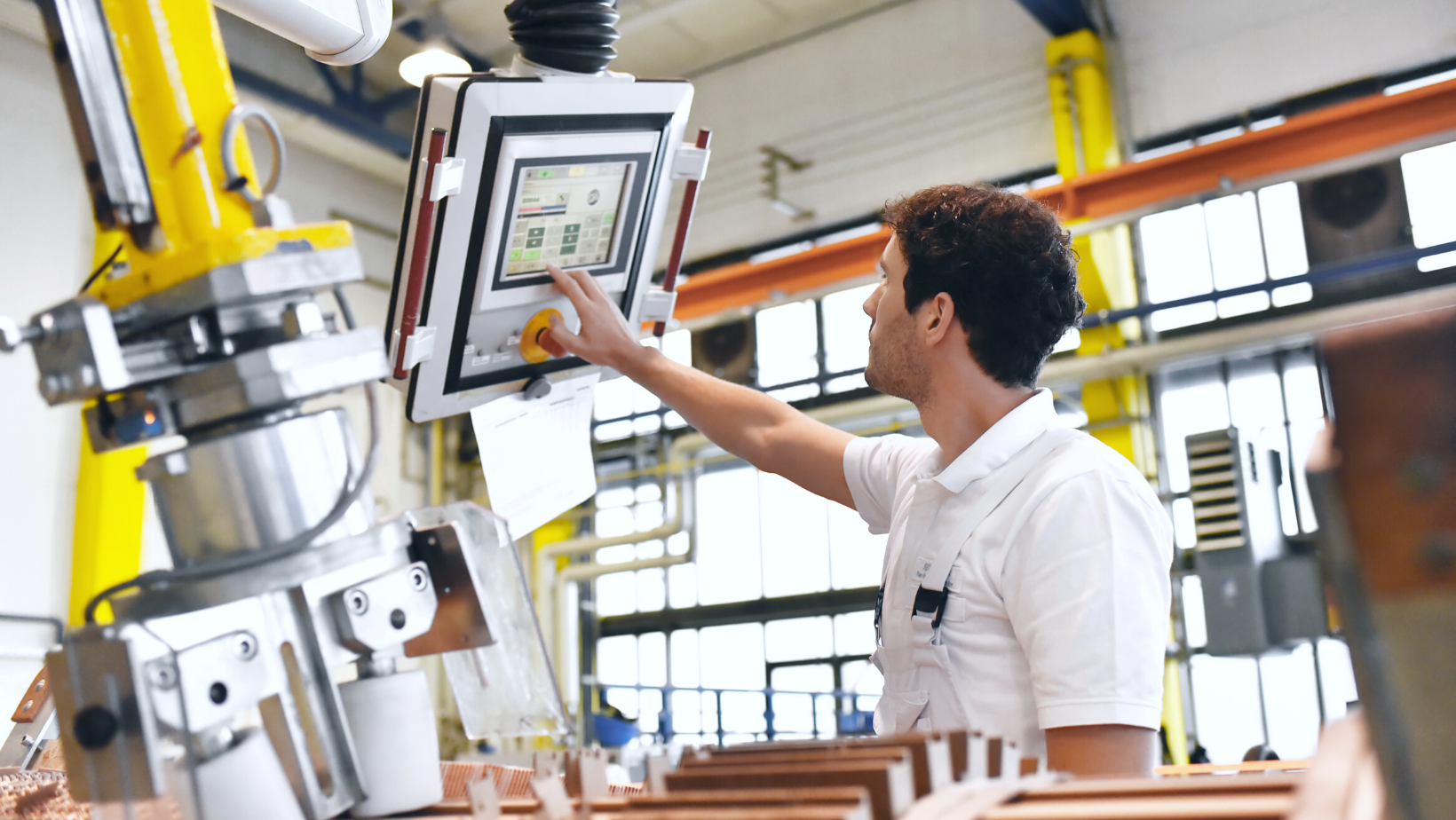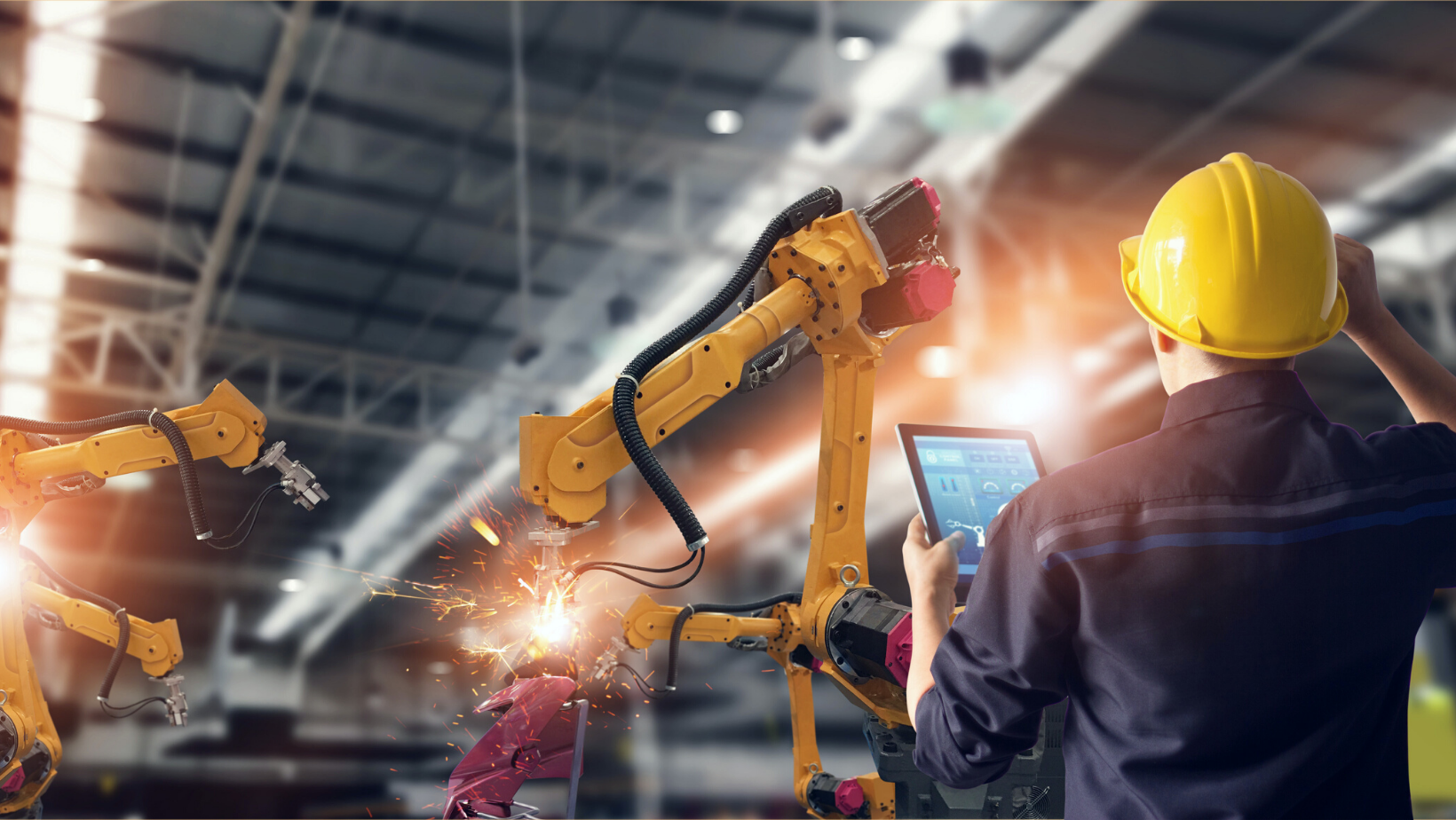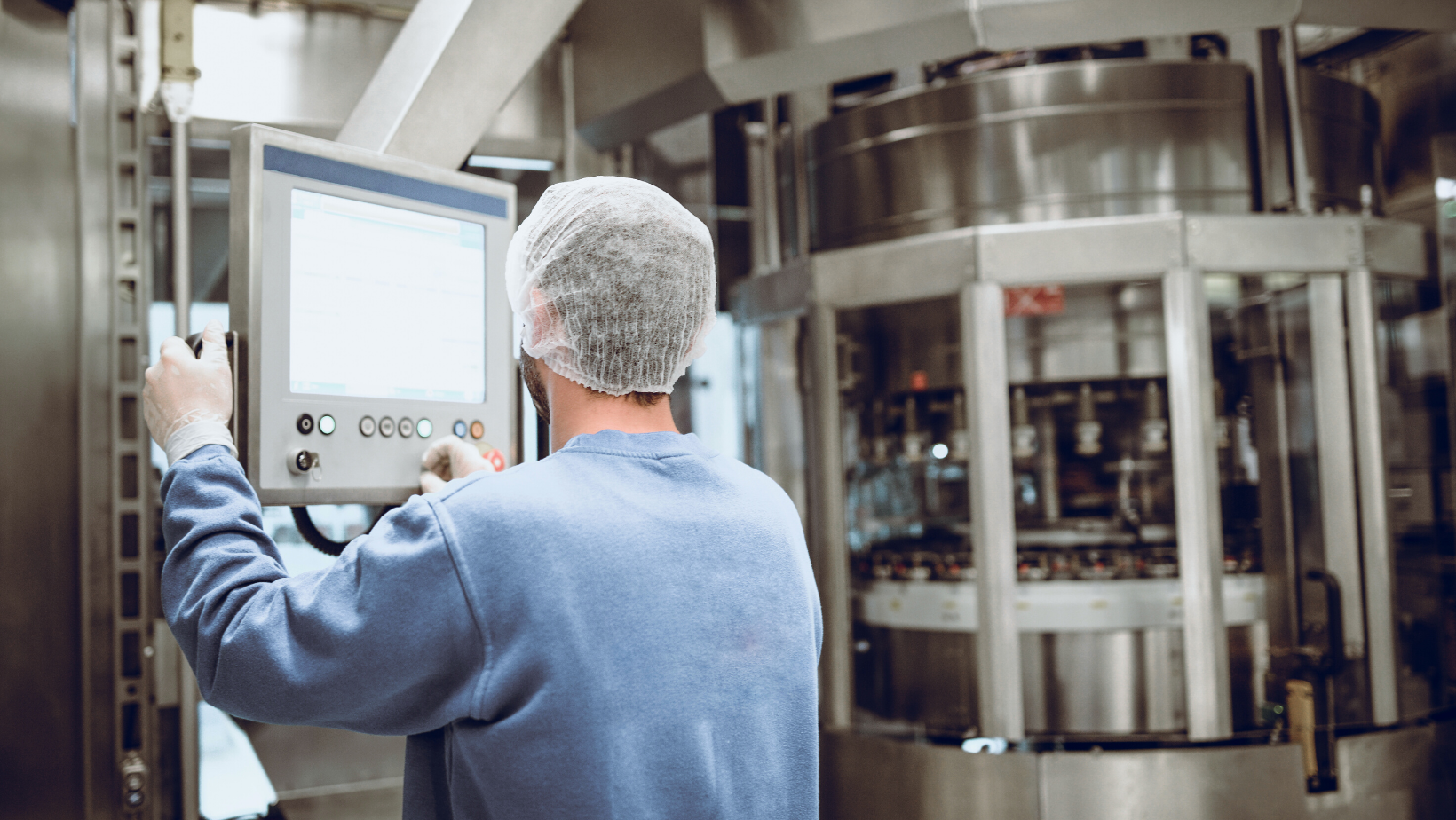How can simple automation aid manufacturing operators?
Even the most simplistic task can be aided through automation. In manufacturing, operators often have to complete repetitive and time-consuming...

Industry 4.0 is upon us, and with it comes new opportunities for the manufacturing sector. If you're not sure what Industry 4.0 is or how it can benefit your business, read on for everything you need to know.
We'll explain the basics of this transformative technology, and show you how to get started today.
Industry 4.0 is all about doing things differently, and the manufacturing industry has taken notice with new innovations in automation and data exchange across production lines to meet changing market demand. This includes cyber-physical systems, the Internet of Things (IoT), as well as cloud computing — which can help drive growth goals for manufacturers who are willing to adapt their mindset from maintaining the status quo towards embracing innovation that will enable them to win over today's demanding customer base.
Industry 4.0 is the intersection of cyber-physical systems and the Internet of Things (IoT). The IoT includes smart sensors that give managers more accurate information on which they can base their decisions for growth in today's competitive environment.
Adopting an Industry 4.0 approach provides a means for navigating change in the manufacturing industry, which is reinventing business models to focus on services that add value and/or entering new geographic markets or adjacent market segments.
In the digital age, many processes and workflows have been streamlined to create more efficient business operations. In process engineering for instance there is a shift towards computer science-influenced techniques such as machine learning which help optimize systems with minimal input from humans while also reducing costs by 40%.
The first step of this process is evaluating how ready manufacturers are by understanding what type of IT they have currently available — it will show them whether any changes need to be made before implementing their strategy moving forward into Industry 4.0
Industry 1.0 involves the very first Industrial Revolution in history. This Industrial Revolution began in the late 1700s and continued into the early 1800s.
During this time, the manufacturing industry evolved from focusing on manual labor done by people helped by work animals to a more efficient form of labor which utilized water and steam-powered engines as well as other types of machine tools during this time period.
Then in the early 1900s, the manufacturing engineering ushered in a new Industrial Revolution known as Industry 2.0. Steel and electricity innovated factory work in a huge way during this time period.
This era was a turning point for production and manufacturing, where we can see mass production truly taking place. Electric machinery replaced water and steam-powered machines which increased efficiency and lowered the cost of maintenance. Also, ideas such as 'the assembly line' were birthed, and productivity skyrocketed as a result of these events.
The third installment of the Industrial Revolution came about in the mid-to-late 20th century with the introduction of computers and the digitization of machines and factory equipment.
The main concepts derived from this new generation of manufacturing were automation, data analysis, and information technology (or IT). Humans went from manually controlling the equipment to digitally controlling the equipment using computers, Human Machine Interfaces (HMI), and Programmable Logic Controllers (or PLCs), resulting in a safer and more efficient workplace.
Finally we arrive at Industry 4.0, our current time and place in history. Industry 4.0 takes digitization of manufacturing to the next level with enhanced communication and a sharp increase in data collection, visualization, and analysis by enabling factory managers to interact with data sourced in real-time from anywhere around the world.
With the introduction of the internet and the advanced level of computer technology we have today, we are able to see efficiency, safety, and quality of production outperform older systems by significant margins. Where Industry 3.0 introduced the digital computer to the factory, Industry 4.0 connects these computers to give factory managers a 'bigger picture' of what's happening on the plant floor even if the manager is across the globe.
Industry 4.0 enables managers to identify potential problems before they occur, track metrics and make predictions, and connect factory workers with management and executive teams seamlessly.
Real-time data management is essentially remote monitoring, control, and analysis of live information from a manufacturing or processing plant to ensure maximum efficiency and productivity without having to be on-site.
This technology gives industry watchers the ability to see and understand what is happening in the plant in real-time, as well as access data logs and archives to review past performance.
The Internet of Things connects users with information from anywhere using the internet and computers or mobile devices. Overseas and offshore operations are able to be monitored 24/7 because of this accessibility.
The Internet of Things (IoT) can be used in conjunction with real-time data management to provide a more complete view of what is happening in a manufacturing or processing plant, mining operation, or any other remote work site.
By linking devices such as sensors, trackers, and RFID tags to the internet, operations managers can collect data on everything from the movement of goods and materials to production levels and worker safety.
This data can be used to improve efficiency and productivity by eliminating waste, reducing downtime, and improving quality control. In addition, it can also be used to improve the handover process as shifts change and monitor contractual obligations as well.
AI (Artificial Intelligence) and Machine Learning are Industry 4.0 concepts that involves the use of computers to learn and make decisions on their own.
AI can be used to monitor data streams for specific events or conditions and then take the appropriate action. For example, if an equipment failure is detected, AI can be used to automatically shut down the machine to prevent further damage.
Machine Learning can also be used to learn how a particular process works and then make suggestions on how to improve it. By monitoring data over time, Machine Learning can help operators optimize production processes and identify areas where improvements can be made.
The industry of manufacturing is constantly evolving as is the technology that powers it, and with the help of these tools it has been able to successfully improve industry productivity, efficiency, and output.
As industries move towards the fourth industrial revolution, more and more emphasis is being put on machine-to-machine (M2M) integration. This refers to the interconnectedness of people, data, devices, and systems that enables real-time communication and collaboration. IoT has the potential to revolutionize manufacturing, making factories more connected, intelligent, and efficient.
Companies like Bosch Rexroth have taken part in the development of Industry 4.0 together with many partners from industry and research. Bosch Rexroth's contribution to this is, among other things, new functions for machine retrofits that allow machines to be used even more efficiently.
These include intelligent service robots that unload conveyor belts and perform other tasks directly on the machine and not in a safety distance. This allows machines to be used 24/7, and provides production with greater process security .
Industry 4.0 is a step forward into the future of manufacturing, and for most businesses it seems like a no-brainer to digitally transform their manufacturing operations to ramp up production.
Each business is different, however, so before you invest significant funds into digitally transforming your operation, consider what kind of return you'll get on that investment and how Industry 4.0 can work for your organization.
If you feel like you lack visibility into your operations, have trouble keeping up with equipment repairs or maintenance, want to increase the level of communication across your organization, or you feel like your production is lacking efficiency, investing Industry 4.0 could solve these issues.
In operations where mass production is standard procedure and you face fierce competition, Industry 4.0 could give your team the advantage in boosting the output and quality of your production, especially if your competition is boosting their own technological capacity.
On the other hand, if you're running a small or medium-sized business with more of a 'craft' or 'artisan' type production, Industry 4.0 might not be necessary at this time as it could be more costly than beneficial.
The important thing is to do your research, understand what Industry 4.0 can do for you and compare the potential benefits to the cost of digitally transformation.
Industry 4.0 has the power to completely update and transform your manufacturing operations in many different ways. From improving the safety of the working environment of you employees to improving the quality of what you're producing, Industry 4.0 could mean the difference between being an industry leader or lagging behind the competition.
The way that this transformation elevates your operations is through connectivity and the Internet of Things. Through connecting your plant floor employees to your management team, each person will be able to adapt to changes in production and adjust their own workflow to mitigate bottlenecks and keep production moving.
Regarding equipment, Industry 4.0 gives you real-time data into the health of the equipment and can also automate maintenance schedules. In many instances, maintenance can be predicted and performed proactively rather than reacting when problems occur (and slowing down production).
Another way Industry 4.0 optimizes manufacturing operations is the capability to gather, store, and visualize data from all aspects of production. Over time, you'll be able to analyze this data to see patterns and insights to improve your operations. Some examples may be identifying and eliminating hidden bottlenecks, wasteful spending, and reducing downtime of employees and equipment.
While still a new and intimidating concept for some businesses, Industry 4.0 is helping leaders in the manufacturing, production, and industrial markets bring better products to market quicker.
Industry 4.0 is giving business leaders the power to constantly adapt to market shifts using data, the internet, and computer technology. This means less downtime and greater efficiency in a safer workplace for employees.
We haven't seen the end of Industry 4.0, we are still in the midst of the evolution of technology and more ways to improve are continuing to be uncovered.
Automation is happening all around us, both in our personal lives as well as in the business and industrial sectors. From our telecommunications to our methods of transportation, there’s no doubt that automation has made daily life and ordinary tasks quicker, easier, and even safer for us.
Automation in manufacturing has improved several areas of production such as lowering operating costs, reducing workplace hazards, and gaining higher quality and consistency in production output.
As technology continues to improve, automation will contmainue to improve as well, which will lead to greater productivity and benefits in the manufacturing and engineering industries. Robotics and Artificial Intelligence will continue to revolutionize and modernize the manufacturing industry, emphasizing the importance of digitally transforming business processes and manufacturing now, so that keeping up with industry standards isn’t difficult or complicated.
Original article by InCentrik
Nevatio Engineering is an agile design and engineering consulting team capable of on-demand mechanical and electrical engineering, functional prototyping, engineering documentation, and machine retrofits. We are experts in machine design, special devices, industrial products, jigs and fixtures, plus automation and controls. Our added knowledge in industry design standards such as ASME, ANSI, ISO, NFPA, NEC and BS allows us to quickly integrate our services with your existing standard design processes, keeping your resources free from unnecessary rework.
We specialize in helping industry leaders solve difficult engineering and design problems. Our mission is to empower our clients with the tools and skills necessary to create solutions to their technical problems. With our expertise, clients can address any technical design problems that stand in their way.
We believe in being consistent with our deliveries. This means that we are always on time and able to work for your business needs, no matter what they may be.

Even the most simplistic task can be aided through automation. In manufacturing, operators often have to complete repetitive and time-consuming...

Having industrial automation is a necessity, but there's a lot of gray area when it comes to calculating the benefits. And part of that gray area is...

As industries move towards the fourth industrial revolution, more and more emphasis is being put on machine-to-machine (M2M) integration. This refers...